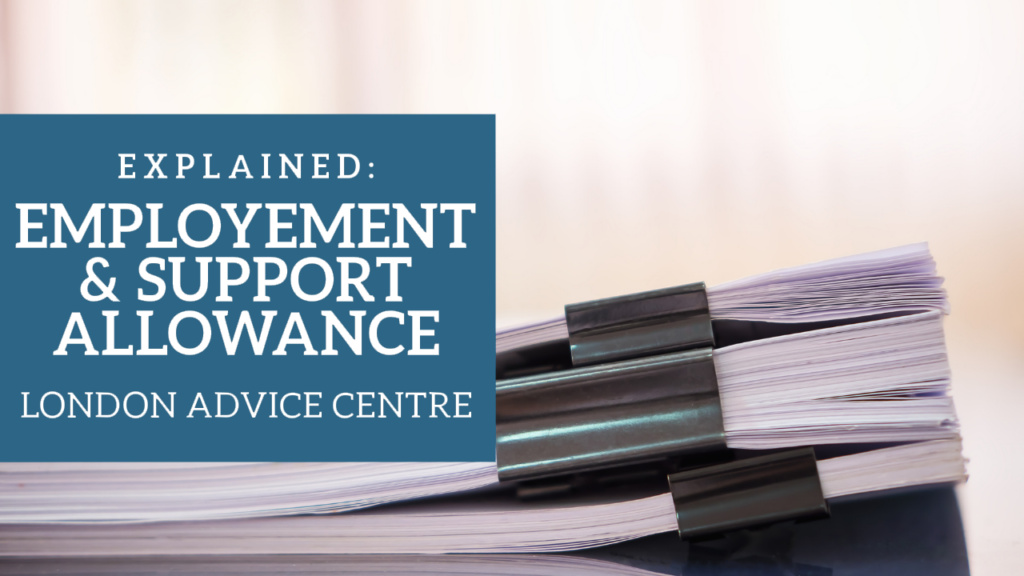
Employment and Support Allowance (ESA) is a benefit available to those with a disability or health condition limiting their ability to work, if at all. It helps cover the costs of daily living if you’re unable to work. It can support you getting back into work (if your health or disability allows it).
The are 2 types of Employment and Support Allowance: new style ESA, or (original) ESA which is split into 2 further sections. You can claim this alongside most other benefits such as Universal Credit (UC). However, you can’t have it as the same time as Statutory Sick Pay (SSP), Income support or Jobseeker’s Allowance (JSA). You claim ESA on your own, but your partners earnings and savings are taken into consideration.
Employment and Support Allowance
Eligibility
- Over 16 years old but under State Pension Age
- Live in England, Scotland or Wales
ESA is split into 2 categories: ‘income-based ESA’ and ‘contribution-based ESA’. Although you can no longer make a claim for ‘contribution-based ESA’, some people still receive it; they may be able to add ‘income-based ESA’ to it. You could be eligible for the extra ‘income-based ESA’ if you have low or no income; less than £16,000 in savings; not subject to immigration control; and, if you live with a partner, they must not work more than 24 hours weekly (the DWP adds your earnings and savings together). You then ask for a ‘supersession’ of your current claim to the Jobcentre or the address on your ESA letters – do not apply for a new claim.
If you’re temporarily ill, you’ll receive Statutory Sick Pay (SSP) for 28 weeks via your employer. Although you can’t then claim for ESA on top of that but you can prepare for it by starting your claim 3 months before you SSP ends.
Assessment
To assess your claim, you’ll attend a Work Capability assessment (in person, via telephone or video call). The meeting is to find out if your health condition or disability affects how much you can work.
During your assessment period you’ll be on a temporary payment rate for 13 weeks. Up to £59.20 if you’re under 25 years old, or up to £74.70 if you’re aged 25 or older. You can backdate your claim once it’s successful.
Following the assessment, you’ll be placed into one of 2 groups. The first: a work-related activity group where you’ll get up to £74.70 weekly. Or the second: a support group where you’ll be eligible for up to £114.10 weekly. You are entitled to the enhanced disability premium if you’re in the support group and also receive income-related ESA. You may be eligible for the severe disability premium.
Payment will be every 2 weeks.
You can still work whilst you claim ESA but must not earn more than £143 weekly or work more than 16 hours.
New Style ESA
New style ESA works very similarly to the previous version. It’s there to support those with a health condition or disability that limits their ability to work (if at all). Claim it alongside or instead of Universal Credit depending on your National Insurance contributions. It’s a contribution-based fortnightly payment, meaning you you’ll be eligible if you have enough National Insurance contribution or credit over the past 2 years.
Eligibility
- Employed, self-employed or unemployed
- Over 16 years old but under State Pension Age
- Live in England, Scotland or Wales
- Met National Insurance (NI) conditions for 2 tax years
NI conditions means you’ve contributed to NI in full, such as both years in employment (or self-employment). Having NI credits for 1 year as credit can also count.
- A doctors/healthcare professional’s note (doctor’s note or fit note)
Following your application, you will attend a meeting with the DWP over the phone, normally via a JobCentre Plus. You’ll be asked about your disability/health condition. Consider how it affects your ability to work. You’ll need to provide medical evidence, then agree to your ‘Claimant Commitments’ which always include updating any change of circumstances. The meeting determines the outcome of your claim. You’ll be notified by the DWP within 10 days after the meeting regarding their decision.
There are 2 ESA groups. A work-related activity group (for 365 days) where you will attend meetings and interviews with a work coach to prepare and improve your skills for future work. And a support group (no time limit) where you are not expected to prepare for future work as your disability/health condition severely limits you.
If affected by coronavirus (COVID-19)
You can apply for new style ESA even if you’re not eligible for Statutory Sick Pay (SSP) if:
- You (or you child) might have COVID-19
- If you (or your child) are recovering from COVID-19
- If you (or your child) are self-isolating
Whether that’s because you came into contact with someone who has COVID-19 or because your doctor/healthcare professional advised you to self-isolate (due to hospital stays or surgery etc.)
- If you’re shielding due to COVID-19 (this has since stopped as of 26 April 2021)
You will have to provide sufficient evidence for your claim to be accepted, such as an isolation note from the NHS (via the app or website) or a letter from your doctor or healthcare advisor asking you shield.
Please note: this post was written in line with guidance at the time of publishing. For the most up-to-date guidelines please refer to gov.uk